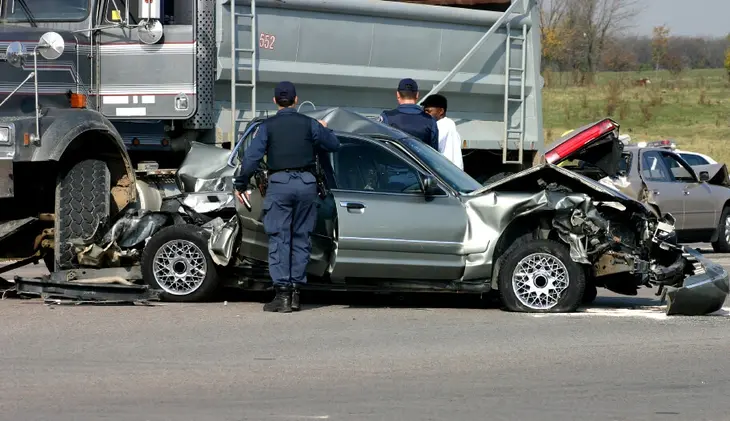Are you looking for an 18 wheeler accident attorney near you to represent you in a personal injury accident?
If so, please read on. It is important that you hire an 18 wheeler accident lawyer who is familiar with the applicable safety and insurance rules. Knowledge of these rules is important because these are the rules the lawyer uses to help you in your personal injury case.
I. 18 wheeler operators are regulated by federal law.
The operation of an 18-wheeler on interstate highways is subject to federal regulations established by the Federal Motor Carrier Safety Administration (FMCSA), which is a division of the U.S. Department of Transportation. Some of the key regulations that apply to the operation of commercial motor vehicles (CMVs) on interstate highways include:
- Hours of service: Drivers of CMVs are subject to limitations on the number of hours they can drive and are required to take breaks and rest periods. For example, a driver cannot drive for more than 11 hours in a 14-hour window and must have at least 10 consecutive hours off-duty before starting a new driving period.
- Weight and size limitations: CMVs are subject to specific weight and size limitations on interstate highways, which vary depending on the type of vehicle and the cargo being transported.
- Equipment requirements: CMVs must be equipped with certain safety features, including brakes, lighting, and reflectors, and must undergo regular inspections and maintenance.
- Driver qualifications: Drivers of CMVs must meet certain qualifications, including possessing a valid commercial driver’s license (CDL) and passing a physical exam.
- Drug and alcohol testing: Drivers of CMVs are subject to drug and alcohol testing, including pre-employment testing and random testing during employment.
These regulations are designed to promote safety on the nation’s highways and reduce the risk of accidents involving commercial motor vehicles.
The Federal Motor Carrier Safety Administration (FMCSA) is a division of the U.S. Department of Transportation that is responsible for regulating and overseeing the safety of commercial motor vehicles (CMVs), including trucks and buses, in interstate commerce. The functions of the FMCSA include:
- Developing and enforcing safety regulations: The FMCSA develops and enforces safety regulations for CMVs, including hours of service limitations, weight and size restrictions, and equipment requirements.
- Conducting safety research and analysis: The FMCSA conducts research and analysis on safety issues related to CMVs and uses this information to inform regulatory decision-making.
- Issuing and enforcing safety standards: The FMCSA issues safety standards for CMVs and enforces these standards through inspections and audits.
- Conducting safety education and outreach: The FMCSA provides safety education and outreach to CMV operators, carriers, and other stakeholders to promote safety awareness and compliance with safety regulations.
- Implementing safety programs: The FMCSA implements safety programs, such as the Compliance, Safety, Accountability (CSA) program, to improve safety performance and reduce the risk of accidents involving CMVs.
Overall, the FMCSA plays a critical role in ensuring the safety of commercial motor vehicles and promoting safety on the nation’s highways.
II. What are drug and alcohol testing rules for 18 wheeler driver?
Drug and alcohol testing rules for 18-wheeler operators are established by the Federal Motor Carrier Safety Administration (FMCSA) under the Department of Transportation (DOT). These rules apply to all drivers of commercial motor vehicles (CMVs) that require a commercial driver’s license (CDL) and operate in interstate commerce.
The following are the drug and alcohol testing rules that apply to 18-wheeler operators:
- Pre-employment testing: All drivers must undergo drug and alcohol testing before being hired by a carrier. This testing must be conducted within 30 days before the driver begins operating a CMV.
- Random testing: Carriers must conduct random drug and alcohol tests of drivers throughout the year. The percentage of drivers to be tested each year is determined by the FMCSA.
- Post-accident testing: Drivers must be tested for drugs and alcohol after any accident involving a fatality or when the driver receives a citation and there is a bodily injury or vehicle tow.
- Reasonable suspicion testing: If a supervisor or manager has reason to believe that a driver may be under the influence of drugs or alcohol, the driver must be tested.
- Return-to-duty testing: Drivers who have tested positive for drugs or alcohol must undergo return-to-duty testing before being allowed to operate a CMV again.
Drivers who test positive for drugs or alcohol are subject to immediate removal from safety-sensitive functions and must undergo evaluation and treatment before being allowed to return to work. The consequences for violating these rules can include fines, suspension or revocation of a CDL, and disqualification from operating a CMV.
The legal citations for the response regarding drug and alcohol testing rules for 18-wheeler operators are as follows:
- Pre-employment testing: 49 CFR Part 40.25
- Random testing: 49 CFR Part 382.305
- Post-accident testing: 49 CFR Part 382.303
- Reasonable suspicion testing: 49 CFR Part 382.307
- Return-to-duty testing: 49 CFR Part 40.305
These citations refer to the specific sections of the Code of Federal Regulations (CFR) that establish the drug and alcohol testing rules for commercial motor vehicle drivers operating in interstate commerce, as enforced by the Federal Motor Carrier Safety Administration (FMCSA) under the Department of Transportation (DOT).
Here is the regulation for post-accident testing under 49 CFR Part 382.303:
“Each employer shall require a driver to submit to an alcohol test as soon as practicable following any accident as defined in §390.5 of this subchapter involving the loss of human life. Each employer shall require a driver to submit to an alcohol test within 8 hours following the accident unless the test cannot be performed during that period for reasons beyond the employer’s control. If the alcohol test is not administered within 8 hours following the accident, the employer shall prepare and maintain on file a record stating the reasons the test was not promptly administered. The record shall be signed by the person designated in §382.305(b)(1) and shall be retained for at least 3 years from the date of the accident.”
This regulation requires employers to administer an alcohol test as soon as practicable following an accident involving the loss of human life. The test must be conducted within 8 hours following the accident, unless it cannot be performed during that period for reasons beyond the employer’s control. If the test cannot be performed within 8 hours, the employer must document the reasons why and maintain the record for at least 3 years from the date of the accident.
III. What are the insurance requirements in Louisiana for 18 wheeler operator?
In Louisiana, commercial motor vehicles (CMVs) including 18-wheeler operators are required to carry minimum insurance coverage to operate on public roads. The insurance requirements are established by the Louisiana Department of Transportation and Development (DOTD) and include the following:
- Liability Insurance: All CMVs operating on public roads in Louisiana must carry liability insurance coverage with a minimum limit of $100,000 for bodily injury or death per person, $300,000 for bodily injury or death per accident, and $50,000 for property damage.
- Cargo Insurance: CMVs that transport goods for hire must also carry cargo insurance coverage that provides a minimum limit of $5,000 per vehicle, per occurrence.
- Uninsured Motorist Insurance: CMVs must carry uninsured motorist insurance coverage with a minimum limit of $15,000 per person and $30,000 per accident for bodily injury or death caused by an uninsured or underinsured motorist.
Please note these are minimum insurance requirements in Louisiana, and carriers may choose to carry higher levels of coverage. Additionally, some types of cargo may require higher levels of insurance coverage based on the nature of the goods being transported. Carriers are ultimately responsible for maintaining proof of insurance and making it available to law enforcement officials upon request.



